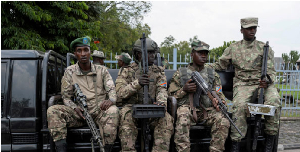Moses Kofi Yahaya
I must grudgingly acknowledge the obvious: SADA is in a tailspin. Revelation that the agency is embroiled in financial mismanagement has cast a pall over its tattered reputation. SADA’s downward spiral must nonetheless be halted before the huge thud that could reverberate beyond the confines of its headquarters in Tamale?
Tellingly, the agency has been tight-lipped about the devastating report issued by the bean counters at the Auditor General’s department. The starched bureaucrats in essence accused SADA of being a cesspool of corruption, a cash cow and a spigot for a select few -- a group derisively referred to as the “northern elite.”
The disclosure has been met with predictable outrage: some have called for heads to roll at the agency, at least the positions of those directly implicated in the financial mess. But more frighteningly, some are clamoring for the complete dissolution of the agency which was created primarily to gin up financial and technical support to promote the development of the north that at last count is still mired in deep poverty.
But before we break into somber funeral dirges for the much maligned agency, it is absolutely important to pause momentarily and reflect on the ramifications that would inevitably ensue were its demise come to pass. One clear effect will be the shuttering of projects that have helped farmers and ordinary folks in the northern regions.
Despite claims to the contrary that SADA’s projects have been a dismal failure, there is a mountain of evidence to indicate that farmers and others have benefitted tremendously from these projects. However despicable and morally reprehensible these acts of financial malfeasance are, they should by no means be grounds for punitive measures against SADA nor should they constitute a blanket indictment of the north.
Absurd and far-fetched as it is, this notion is fast gaining currency among many of SADA’s detractors. Just sample some of the acerbic comments about SADA that greeted the AG’s report and the vitriol hit you in the face like a sledgehammer. Managerial competence I should point out is not the exclusive preserve of one ethnic group.
If anyone would care to admit, SADA’s troubles are indeed a reflection of the endemic corruption that unfortunately plagues public life in Ghana. In fact, since independence when the administration of the nation was transferred to Ghanaians by British colonialists, educated elites from all ethnic groups in positions of authority have fed at the public trough with impunity. And the sad fact is that not many of these pilferers have paid the price ---hauled off to jail in handcuffs. Instead, they ride off into the sunset to enjoy their ill-gotten loot.
There is one undeniable truth that somehow gets overlooked in the narrative about SADA’S managerial problems. No agency capitalized by the state can claim immunity from graft and corruption as borne out by the odious rot that ultimately doomed the nation’s once premier airline, Ghana Airways and the regional development corporations of the 1980s that once were touted as vehicles of regional integration and development. The corruption at SADA should be seen in this context.
Of course, I am not exonerating SADA. Yes, SADA is culpable in large measure, but so should the government for inexplicably allowing SADA to operate with a free rein minus a corresponding regime of strident regulations to ensure fiscal integrity.
Could SADA’s management have done a better job to ward off charges of inertia and incompetency? Yes, with prudent financial management and an acute awareness of the lingering hatred and incendiary rhetoric emanating from southern legislators who saw the creation of the agency as yet another give-away to the north.
Given the public display of such naked animosity towards the agency, the head-honchos at SADA should have known that any appearance of financial impropriety was bound to draw the instant wrath and unrelenting scrutiny of its detractors and ultimately calls for its dissolution.
Like other northerners overly concerned with the welfare of the region and its inhabitants and similarly concerned about how agencies charged with guiding the region in its quest to “catch” up with the south are administered, I am troubled by the fiduciary lapses at SADA.
To stem charges of incompetency and corruption and create confidence in its ability to discharge its assigned duties, the agency should, as a matter of urgency do these things: get involved in education and health, establish relations with the University of Development Studies and other institutions of higher learning in the north, move away from awarding contracts and funding projects, but more crucially recruit talent from other ethnic groups outside the northern regions.
Opinions of Monday, 21 April 2014
Columnist: Yahaya, Moses Kofi








![Isaac Kwadwo Ampong [L] and President John Mahama Isaac Kwadwo Ampong [L] and President John Mahama](https://cdn.ghanaweb.com/imagelib/pics/549/54996138.295.jpg)





